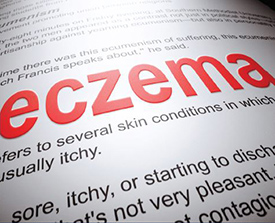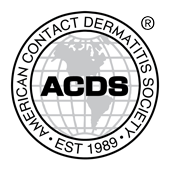Eczema FAQ
The American Contact Dermatitis Society (ACDS) was founded in 1989 and has grown from a small dedicated group of dermatologists focused on contact dermatitis to over 2,500 health care professionals specializing in the field of allergic contact dermatitis and related inflammatory skin diseases.
Below are some frequently asked questions regarding eczema. To find a provider in your area that might specialize in eczema, please visit the ACDS Find a Provider Directory.
What is Eczema?
What are the types of Eczema?
How is Eczema treated?
What is Eczema?
 Eczema, also known as dermatitis, is an itchy bumpy rash that can have many causes. Although eczema is a nonspecific term, many people use this term interchangeably with ‘atopic dermatitis’, which is actually only one kind of eczema. All types of eczema may look very similar to one another, and require a medical professional to diagnose them correctly. It is common for one person to have more than one kind of eczema.
Eczema, also known as dermatitis, is an itchy bumpy rash that can have many causes. Although eczema is a nonspecific term, many people use this term interchangeably with ‘atopic dermatitis’, which is actually only one kind of eczema. All types of eczema may look very similar to one another, and require a medical professional to diagnose them correctly. It is common for one person to have more than one kind of eczema.
- Atopic dermatitis is a familial disease which can affect infants, children, and adults. It is often accompanied by asthma or allergies.
- Nummular dermatitis is characterized by coin-shaped lesions mainly located on the extremities, buttocks, and trunk.
- Asteatotic eczema is a form of eczema caused by dry skin.
- Dyshidrotic eczema consists of itchy blisters on the hands or feet.
- Stasis dermatitis occurs at areas where poor circulation cause fluids to accumulate under the skin and is most common on the lower legs.
- Irritant contact dermatitis is a rash that occurs at the site of skin contact with a substance that results in damage to the skin barrier.
- Allergic contact dermatitis is triggered by contact with a substance that a person is allergic to. It is diagnosed by skin patch testing. This is a particularly important form of eczema to recognize since it is curable with avoiding substances that one is allergic to. This differs from most other forms of eczema, which tend to be chronic and recurrent.
How is Eczema treated?
Successful treatment of eczema requires accurate diagnosis of the cause(s) of your eczema so that each can be addressed. Treatment will include measures meant to protect your skin barrier, such as minimizing your skin care products, taking short lukewarm baths or showers, and frequent application of bland fragrance-free moisturizing creams or ointments. In addition, topical, oral, and injectable anti-inflammatory medications, as well as light therapy, may be used.
Any component of irritant and allergic contact dermatitis will need to be treated by avoiding contact with the substance(s) that caused the reaction. Although most forms of eczema tend to be chronic, allergic contact dermatitis is usually curable with avoidance of whatever substance(s) you are allergic to. A procedure called patch testing is often needed to help diagnose allergic contact dermatitis. For a listing of health care providers that perform patch testing, you can access the American Contact Dermatitis Society Find a Provider database.

